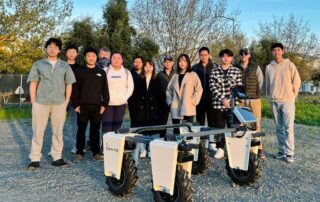UC food-safety specialist tests biosensors to ensure safe produce
Courtesy of the UCANR News
Ahmed El-Moghazy joined UC Agriculture and Natural Resources as a UC Cooperative Extension food safety specialist in February and is based at UC Riverside. Food safety, according to El-Moghazy, are measures that ensure food is free from harmful contaminants, prevent foodborne illnesses and is safe to eat. El-Moghazy is responsible for assisting California farmers and food processing facilities to enhance food safety practices by training appropriate personnel and addressing food-safety issues on their farms.
As the principal investigator for the 2-SAFE Lab at UC Riverside, El-Moghazy is investigating the accuracy and applicability of point-of-use biosensor technology. The small, lightweight and easy-to-use sensor can be used while out in the field or in a packing house to test contamination of liquids such as irrigation and washing water or solids like food samples.
Testing for foodborne pathogens traditionally takes two to three days and the process can be costly. The biosensor technology that El-Moghazy is using is inexpensive and can provide results within one work shift, which allows businesses that grow fresh produce to confirm the safety of their products before sending them to the market.
The alternative, selling contaminated food to consumers, is not only detrimental to human health, but can ruin the reputation of businesses, making way for unanticipated costs associated with recalling contaminated products and regulatory consequences including fines and sanctions.
El-Moghazy is also developing the next generation of antimicrobial surface coatings and materials that can rapidly control the foodborne pathogens and hinder the transfer of harmful bacteria from contaminated food to non-contaminated food.
El-Moghazy is optimistic that his research can safeguard public health, reduce the burden of foodborne illness and protect the integrity of businesses. Although El-Moghazy serves the entire state, he is dedicating a large part of his needs assessment and efforts in Southern California where high-value specialty crops such as avocados and citrus are grown.
“Did you know that one in every six Americans get sick from eating food contaminated with a foodborne pathogen?” asked El-Moghazy. Understanding the fatality of foodborne illnesses, El-Moghazy believes that increasing awareness through education is an essential aspect of his role. “It’s true, but not many people realize this, or that 40% of foodborne illnesses stem from fresh produce.”
To protect consumers, the U.S. Food and Drug Administration requires farms with a certain level of annual sales (adjusted for inflation) of fruits and vegetables typically consumed raw to have one employee who has completed an FDA-approved Produce Safety Rule Grower Training.
In addition to certified trainings, El-Moghazy offers technical assistance to ensure growers comply before and after inspections, as well as resources for several topics including produce safety, agriculture water, flooding, soil amendments, worker health, hygiene and training and postharvest handling and sanitation. He can also assist in developing food-safety plans and other general farm food-safety protocols. His technical expertise covers all aspects of food production and supply including irrigation water quality, hygiene of harvesting tools and transportation.
Before joining ANR, El-Moghazy completed two years as a visiting scholar in the UC Davis Biological and Agricultural Engineering department before continuing as a postdoctoral fellow in the UC Davis Food Science and Technology department for 5 years. Much of his work was rooted in the development of biosensors and antimicrobial materials for food safety. While in Davis, he collaborated with local farms and food processing companies on food safety research and extension.
El-Moghazy earned a Ph.D. studying developmental biosensors for food safety applications to detect pesticides residues from a joint program offered by University of Perpignan in France and Alexandria University in Egypt. He also earned a master’s degree in developmental biobased fungicides and a bachelor’s in agriculture science from Alexandria University. Finally, he completed a fellowship at the Institute of Plant Protection, Szent Istvan University in Hungary, where he studied how to extend shelf-life of fresh produce using biomaterials.
El-Moghazy is based at UC Riverside in the Department of Microbiology and Plant Pathology. He can be reached at aelmogha@ucr.edu or (951) 827-0257.











